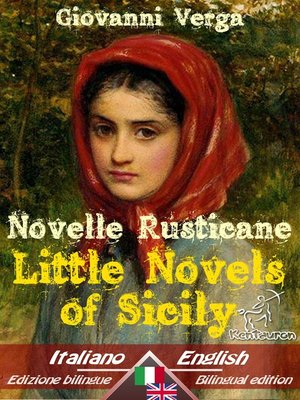Novelle Rusticane--Little Novels of Sicily
ebook ∣ Bilingual parallel text--Bilingue con testo inglese a fronte: Italian--English / Italiano--Inglese (Dual Language Easy Reader)
By Giovanni Verga

Sign up to save your library
With an OverDrive account, you can save your favorite libraries for at-a-glance information about availability. Find out more about OverDrive accounts.
Find this title in Libby, the library reading app by OverDrive.



Search for a digital library with this title
Title found at these libraries:
| Library Name | Distance |
|---|---|
| Loading... |
Se sei interessato ad imparare o migliorare il tuo inglese o il tuo italiano, questa edizione contiene una delle più fedeli traduzioni di questo capolavoro. Una versione Inglese-Italiano con paragrafo a fronte facile da leggere.
§
Questo ebook è basato sull'opera di Giovanni Verga Novelle Rusticane scritta nel 1883.
La traduzione è dello scrittore e poeta D. H. Lawrence.
Il testo del romanzo è completo e inalterato.
Giovanni Carmelo Verga (2 September 1840 – 27 January 1922) was an Italian realist (Verismo) writer, best known for his depictions of life in his native Sicily, and especially for the short story (and later play) Cavalleria Rusticana and the novel I Malavoglia (The House by the Medlar Tree).
Sicilian novelist and playwright, is surely the greatest writer of Italian fiction, after Manzoni.
As a young man he left Sicily to work at literature and mingle with society in Florence and Milan, and these two cities, especially the latter, claim a large share of his mature years. He came back, however, to his beloved Sicily, to Catania, the seaport under Etna, to be once more Sicilian of the Sicilians and spend his long declining years in his own place.
Translator D. H. Lawrence surely found echoes of his own upbringing in Verga's sketches of Sicilian life: the class struggle between property owners and tenants, the relationship between men and the land, and the unsentimental, sometimes startlingly lyric evocation of the landscape. Just as Lawrence veers between loving and despising the industrial North and its people, so too Verga shifts between affection for and ironic detachment from the superstitious, uneducated, downtrodden working poor of Sicily. If Verga reserves pity for anyone or anything, it is the children and the animals, but he doesn't spare them. In his experience, it is the innocents who suffer first and last and always.
Italian easy readers: If you are learning or improving your Italian or English as second language, grab this bilingual edition containing a bilingual edition of this masterpiece. An easy to read paragraph by paragraph Italian-English parallel text version.







